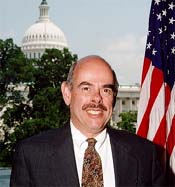 |


Questioned by Congressman |
|
By Henry A. Waxman U.S. House of Representatives Did NBC Make Call With Welch in the Backfield? August 13, 2001
His legal case was made all the harder by the label "sore loser" instead of "defending champion." That's no small thing. In fact, it turned out to be nearly as important in deciding the 2000 election as the Supreme Court's 5-4 decision in favor of Bush. So it's more than a nicety to provide accurate reassurances to the public that each network made its decision fairly and on the merits. In February, House Republicans summoned the heads of the networks' news divisions to testify at a congressional hearing on election night coverage. At that time, it was already known that Bush's cousin--John Ellis--was a consultant on the election night decision desk at Fox News and was instrumental in that network's decision to call Florida and the national election for Bush (Fox was the first network to do so). Moreover, a troubling and persistent rumor was circulating that Jack Welch, chairman and CEO of General Electric, which owns NBC, might have tried to interfere with NBC's election calls. I've frequently seen allegations take on a life of their own--especially in tightly contested elections--so I tried to put this one to rest by raising it directly with Andy Lack, then-president of NBC News. I also asked whether it was true that an advertising and promotion videotape existed that could firmly verify or debunk the whispers about the conduct of Welch, a Bush partisan. Under oath, Lack denied the rumor but promised to supply the advertising videotape if it existed. Neither he nor the NBC lawyers at the hearing raised 1st Amendment reservations. After the hearing, NBC confirmed that it had the footage.
Moreover, this footage can provide a definitive answer to a question of compelling public interest: whether the chairman of General Electric inappropriately tried to influence NBC's critical decision to call the 2000 election for Bush. NBC is a special entity. It exists because it has the use--without charge--of the public airwaves. In return, it has been given the duty of serving the public interest. That brings with it special obligations, including the duty to earn the public's confidence by adhering to the highest standards of conduct. This is especially important because NBC doesn't exist just as a news division or a broadcaster; those days are long gone. It is owned by General Electric, whose corporate interests range from toasters to promoting nuclear power to selling defense weapons. All of those interests are significantly affected by who's elected president. General Electric has every right to advocate its corporate interest; but an inviolate wall must exist between it and its wholly owned television subsidiary. When credible questions are raised about a news organization's conduct, it should be extraordinarily forthcoming, even if disclosure causes embarrassment. Indeed, the news media expect no less from the subjects of its journalism. Using the 1st Amendment to cloak conflicts of interest serves to protect nothing--no ideal, no source and no free press. It only conceals the intrusion of corporate managers into ostensibly objective journalism. I don't know if Jack Welch acted inappropriately on election night, but it's a question that's both easily answered and worth answering. The question now is why GE/NBC won't do so, even at the risk of breaking a sworn commitment to Congress |

 Rep. Henry Waxman: Questions NBC's ethics on Election Night 2000
Rep. Henry Waxman: Questions NBC's ethics on Election Night 2000